
CAMBRIDGE JOURNAL OF ECONOMICS
Scope & Guideline
Navigating the Complexities of Economic Thought
Introduction
Aims and Scopes
- Interdisciplinary Economic Analysis:
The journal emphasizes the integration of diverse disciplines within economics, encouraging contributions that draw from sociology, political science, and philosophy to provide comprehensive analyses of economic issues. - Critique of Mainstream Economics:
A consistent focus is placed on critiques of conventional economic theories, particularly those related to market behavior, financialization, and the socio-economic implications of economic policies. - Historical and Ontological Perspectives:
The journal publishes research exploring the historical evolution of economic thought and ontological inquiries into the nature of economic entities, reflecting on how these aspects shape contemporary economic discourse. - Focus on Labour and Employment Relations:
There is a notable emphasis on labor economics, exploring themes such as employment relations, wage dynamics, and the impact of institutional frameworks on labor markets. - Development Economics:
Research that addresses economic development, particularly in relation to financialization, inequality, and the role of institutions in shaping development outcomes, is a core area of interest. - Environmental and Social Justice Economics:
The journal is increasingly addressing issues of environmental economics and social equity, examining the intersections between economic practices and their socio-environmental impacts.
Trending and Emerging
- Financialization and Its Impacts:
A growing body of research is dedicated to exploring financialization, particularly its effects on economic stability, inequality, and labor markets, highlighting its relevance in contemporary economic discussions. - Working Time and Labor Dynamics:
Emerging analyses focus on the changing nature of work, including discussions on working time reduction, gig economies, and the impact of technology on labor relations, reflecting broader societal shifts. - Environmental Economics and Sustainability:
Research addressing the economic implications of environmental issues and sustainable practices is gaining traction, indicating an increasing recognition of the importance of ecological considerations in economic analysis. - Critical Perspectives on Economic Policy:
There is a notable trend towards critical examinations of economic policies, especially those related to the COVID-19 pandemic, Brexit, and their socio-economic ramifications, emphasizing the need for adaptive policy frameworks. - Inequality and Social Justice:
An emerging focus on income inequality, wealth distribution, and the socio-political dimensions of economic justice is evident, reflecting a growing concern for equity in economic discourse. - Technology and Capitalism:
Research on the implications of digital technologies and platform capitalism is on the rise, exploring how these innovations reshape economic structures and labor dynamics.
Declining or Waning
- Traditional Economic Models:
There has been a noticeable decrease in the publication of papers relying on traditional neoclassical economic models, suggesting a shift towards more critical and alternative approaches to economic analysis. - Focus on Purely Quantitative Studies:
Research centered exclusively on quantitative methodologies appears to be declining, with an increasing preference for qualitative and mixed-method approaches that provide richer contextual insights. - Conventional Macroeconomic Policies:
Discussions around standard macroeconomic policies, such as those focusing solely on inflation targeting or fiscal austerity, are less frequent, indicating a movement towards more nuanced critiques and alternative policy frameworks. - Single-Dimensional Analyses of Economic Issues:
There is a diminishing tendency to publish papers that approach economic issues from a singular perspective, as the journal increasingly favors interdisciplinary and multifaceted analyses that capture the complexity of economic phenomena.
Similar Journals
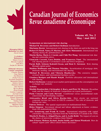
CANADIAN JOURNAL OF ECONOMICS-REVUE CANADIENNE D ECONOMIQUE
Where Rigorous Analysis Meets Scholarly ExcellenceThe Canadian Journal of Economics - Revue Canadienne d'Économique is a prestigious academic journal published by Wiley, dedicated to advancing research in the field of economics and econometrics. With its ISSN 0008-4085 and E-ISSN 1540-5982, this journal has been a vital resource since its inception in 1977, offering a platform for the dissemination of high-quality research and scholarly articles. As a distinguished Q2 journal in the 2023 Economics and Econometrics category, it ranks #405 out of 716 within the Scopus database, showcasing its influence and relevance in the academic community. Although it does not feature an open-access model, the journal remains committed to providing rigorous analysis and critical insights that resonate with researchers, professionals, and students alike. Its scope encompasses a wide range of economic disciplines, making it an essential publication for those seeking to stay at the forefront of economic thought and practice.
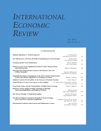
INTERNATIONAL ECONOMIC REVIEW
Advancing economic discourse for a changing world.INTERNATIONAL ECONOMIC REVIEW is a prestigious journal dedicated to advancing knowledge in the fields of economics and econometrics. Published by Wiley in the United Kingdom, this journal boasts an impressive Q1 ranking in the 2023 category of Economics and Econometrics, reflecting its significant impact in the academic community. With a continued publication since its inception in 1979, it offers a platform for rigorous scholarly articles that address contemporary issues, theoretical developments, and empirical findings in economics. Although it does not currently offer open access options, the journal maintains broad accessibility through institutional subscriptions. Researchers, professionals, and students are encouraged to contribute to and engage with this leading publication to foster knowledge exchange and stimulate scholarly dialogue in economic research. With its commitment to high-quality scholarship, the INTERNATIONAL ECONOMIC REVIEW remains a vital resource for developing insights that inform both policy and practice.

MANCHESTER SCHOOL
Pioneering rigorous research for a dynamic economic landscape.MANCHESTER SCHOOL, published by WILEY, is a leading academic journal in the field of Economics and Econometrics, with a rich legacy dating back to 1930. This esteemed journal fosters scholarly discourse by providing a platform for high-quality research articles that cover a broad spectrum of economic theories, empirical studies, and methodological advancements. With an impact factor reflective of its relevance and rigor, MANCHESTER SCHOOL is ranked in the Q3 category in Economics and Econometrics and holds a Scopus rank of #447 out of 716, placing it in the 37th percentile. Researchers and practitioners alike can access a wealth of knowledge through its diverse range of articles, contributing significantly to the advancement of economic science. While it does not offer Open Access options, the journal maintains a commitment to accessibility by providing in-depth analyses and discussions that are crucial for understanding contemporary economic challenges. Based in the United Kingdom, MANCHESTER SCHOOL continues to uphold its standard of excellence well into 2024 and beyond.
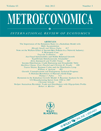
Metroeconomica
Shaping the Future of Economic Research.Metroeconomica is a prestigious journal published by WILEY, focusing on the dynamic fields of Economics and Econometrics. Known for its rigorous peer-review process, this journal prides itself on disseminating high-quality research that informs and inspires scholars and practitioners alike. With an impact factor reflective of its significance in the discipline, Metroeconomica is categorized in the Q2 quartile for 2023, representing its competitive standing among influential economics publications. Since its inception in 1949 and continuing through a converged publication period until 2024, it has contributed significantly to advancing theoretical and empirical knowledge in economics. Researchers can access its content through traditional avenues, encouraging a wide readership among academics and industry experts. As the journal continues to evolve with the changing landscape of economic research, it remains a vital resource for those seeking to explore contemporary economic issues and foster impactful discussions within the field.
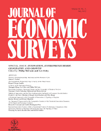
JOURNAL OF ECONOMIC SURVEYS
Unveiling Trends, Shaping Economic FuturesJOURNAL OF ECONOMIC SURVEYS, published by WILEY, is a highly esteemed peer-reviewed journal dedicated to the field of economics and econometrics. With its distinguished position as a Q1 journal and a Scopus rank of #38 out of 716, the journal consistently showcases cutting-edge research that significantly contributes to the understanding and development of economic theories and practices. Since its inception in 1987, this journal has been a cornerstone for economists, providing vital surveys that systematically address contemporary issues and emerging trends within the discipline. Researchers and practitioners alike rely on the journal for its rigorous analysis and comprehensive reviews, making it an essential resource for anyone involved in economic research. Although the journal does not currently offer open access options, its exceptional impact and relevance in the field continue to engage a global audience of scholars and policymakers.
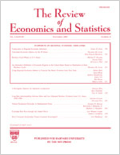
REVIEW OF ECONOMICS AND STATISTICS
Connecting theory and practice in the world of economics.REVIEW OF ECONOMICS AND STATISTICS, published by MIT PRESS, stands as a pivotal journal in the fields of economics and econometrics, with origins dating back to 1978. As a high-impact publication with impressive 2023 rankings placing it in the Q1 category for both Economics and Econometrics, and Social Sciences (miscellaneous), it serves as a crucial platform for scholarly discourse. With an E-ISSN of 1530-9142, the journal provides vital insights and analyses that drive contemporary understanding of economic phenomena. Recognized for its rigorous peer-review process and influential research, the REVIEW OF ECONOMICS AND STATISTICS is essential for researchers, professionals, and students aiming to advance their knowledge and contribute to the field. Though it does not currently offer open access, its substantial impact factor and cutting-edge studies ensure that its articles remain indispensable resources for anyone dedicated to the advancement of economic research.

REVUE ECONOMIQUE
Fostering Dialogues on Economic DynamicsREVUE ECONOMIQUE, published by PRESSES FOND NAT SCI POLIT in France, is a distinguished academic journal with an ISSN of 0035-2764 and an E-ISSN of 1950-6694. Established in 1974, the journal has evolved significantly over the years, focusing on a diverse range of topics within the field of economics, econometrics, and finance. With its commitment to presenting in-depth research and innovative perspectives, REVUE ECONOMIQUE serves as a vital resource for scholars, professionals, and students seeking to enhance their understanding of economic theories and practices. Although it is currently categorized in the Q4 quartile, ranking 241 out of 288 in the field, the journal aims to foster new dialogues and disseminate valuable insights that contribute to the economic discourse. The journal is not available as open access, but its rich repository of articles continues to attract readers interested in the complexities of economic dynamics. For more information, you can refer to their address at 27 RUE SAINT-GUILLAUME, 75341 PARIS 07, FRANCE.
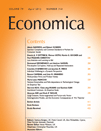
ECONOMICA
Exploring the Depths of Economic ResearchEconomica is a prestigious academic journal published by Wiley, with a rich history dating back to 1937. Based in the United Kingdom, this journal has established itself as a key resource in the field of Economics and Econometrics, classified in the top quartile (Q1) of its category for 2023. With an ISSN of 0013-0427 and an E-ISSN of 1468-0335, Economica covers a wide array of topics that contribute to the understanding of economic theory and practice, making it essential reading for researchers, professionals, and students alike. Despite being a subscription-based journal, its rigorous editorial process ensures that only the highest quality research is published, further bolstering its impact and influence in the academic community. The journal plays a vital role in advancing economic scholarship by featuring original research articles, critical reviews, and innovative methodologies, promoting discourse among scholars and practitioners.
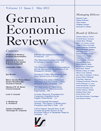
German Economic Review
Pioneering New Perspectives in Economic ResearchGerman Economic Review is a distinguished academic journal published by WALTER DE GRUYTER GMBH, focusing on diverse aspects of economics and econometrics. With its ISSN 1465-6485 and E-ISSN 1468-0475, the journal serves as a vital platform for disseminating high-quality research from both established scholars and emerging voices in the economic field. Housed in the UK, the journal contributes significantly to the academic community, evidenced by its placement in the Q3 category for Economics and Econometrics in 2023 and its Scopus ranking of #381 out of 716, reflecting its impactful presence in the discipline. German Economic Review does not offer open access options; however, its convergence from 2001 to 2024 indicates a long-standing commitment to advancing economic discourse. This journal is ideal for researchers, professionals, and students eager to engage with contemporary economic theories and applications.

Ekonomista
Connecting ideas, researchers, and policymakers in economics.Ekonomista is a distinguished open-access journal dedicated to the field of economics, published by the Polskie Towarzystwo Ekonomiczne. Since its transition to open access in 2022, the journal has enhanced its mission to disseminate high-quality research that serves the academic community and informs policymakers. With an ISSN of 0013-3205 and an E-ISSN of 2299-6184, Ekonomista aims to foster rigorous discussions and innovative perspectives on current economic issues. Although it has experienced lapses in coverage through Scopus, its commitment to advancing knowledge in Economics, particularly in the realms of econometrics and finance, remains steadfast. The journal is indexed within the lower echelons of Scopus rankings, providing an opportunity for new voices in the discipline to emerge and contribute to the ongoing discourse. Positioned at ul. Nowy Swiat 49 in Warszawa, Poland, Ekonomista not only connects researchers and professionals but also serves as an educational resource for students aiming to deepen their understanding of economic theories and practices.